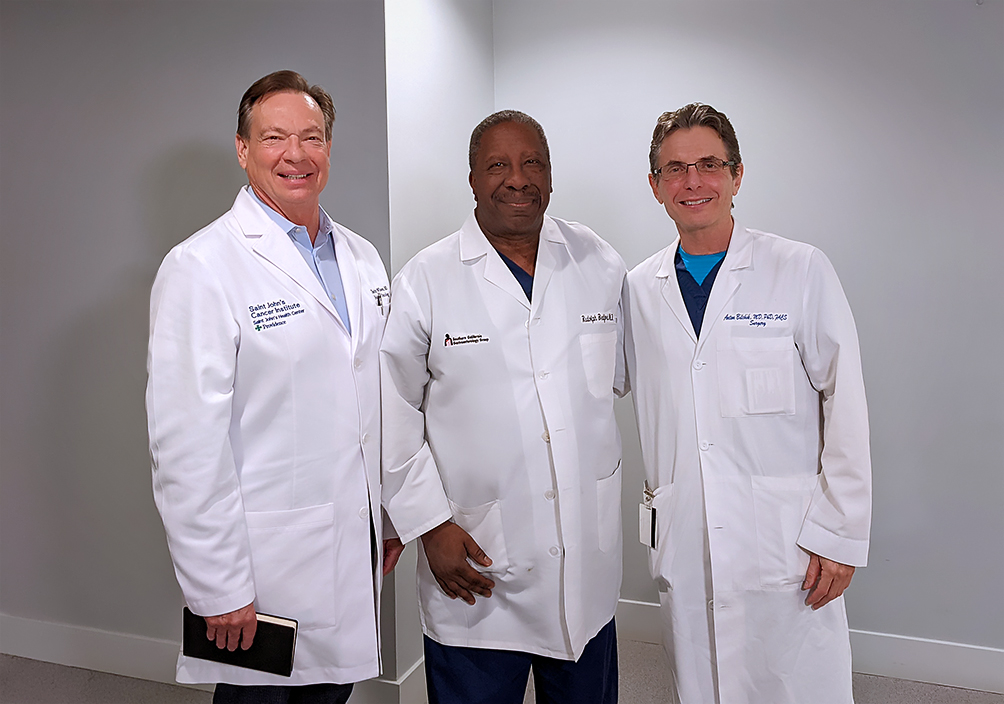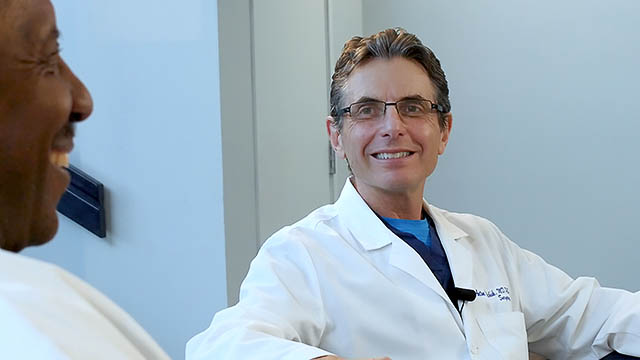
Even an expert oncologist will be excessively concerned with a possible cancer diagnosis.
Dr. Wilson promptly called his peers at the Digestive Health Institute, located in Providence, Saint John’s Health Center, to schedule a colonoscopy because his Cologuard® came back positive for possible colon cancer. Cancer concerns us all, and knowing what to do and who to trust is invaluable. So invaluable, Dr. Wilson hopes to share his experience with the world, allowing gastrointestinal experts Dr. Rudolph Bedford and Dr. Anton Bilchik to outline our process for personalized treatment, including screening and diagnosis, at Saint John’s in Santa Monica, California.
Knowing it was just a polyp and not cancer, Dr. Wilson’s concerns turned into genuine curiosity and support.
“I thought after my experience, which I thought was phenomenal, and after working here for 8.5 years, knowing how great the health care is here, the people in Los Angeles, and the world, need to know how great it is,” says Dr. Timothy Wilson, the foremost expert in robot-assisted surgery for urologic cancers and conditions. He is the Professor and Chair of Urology and Urologic Oncology at Saint John’s Cancer Institute.
“How old are you…42?” says Dr. Bilchik, Chief of General Surgery, Director of Gastrointestinal and Hepatobiliary diseases, and Professor of Surgery, jokingly to Dr. Wilson. “I’m not sure if the inspiration comes from the propofol or the colonoscopy, or a combination thereof,” he adds as our three experts laugh in unison, juxtaposing one another.
What makes the Digestive Health Institute special at Saint John’s?
So, why can’t you find answers quickly at other institutions?
The process at other institutions is protracted because doctors tend to work in silos; separated from other specialists. At Saint John’s, our vision of quality-of-care stems from our doctor’s ability to connect with other disciplines within minutes and schedule diagnostic tests, to discuss as a team an optimal treatment plan. “We recognize the value of in better alignment with multidisciplinary teams that are closely intertwined combined with cutting edge research,” says Dr. Bilchik. He adds, “The best results with cancer are based on optimal sequencing…the only way to provide that kind of care is to get multiple disciplines involved without anyone having an ego.”
What does a more responsive diagnosis mean for our patients?
Understanding treatment options sooner is reassuring to patients and helps to build trust. “We face a lot of gratitude for just being there and being available. We have patients coming from other states that we’ve operated on together that are willing to drive from another state to come and get post-operative or a follow-up appointment because they are confident in our team,” Dr. Bilchik mentions.
One such case was with a Kathleen Spinoza. She was diagnosed with terminal metastatic neuroendocrine cancer and given 6 to 8 months to live. She discovered Dr. Bilchik after months of searching the country for any option. Since he was the only surgeon willing to operate on her and determine if anything could be done, she is alive today because of this ability to operate in an expedited fashion. That was 12 years ago. She drives yearly from another state for her follow-up appointment with Dr. Bilchik. To listen to Kathleen’s phenomenal journey, click here.
Jack Burns was another case. Last year, he didn’t know he had late-stage esophageal cancer though he waited at another hospital for a diagnostic test that would take months. Jack advocated for a faster approach and found Dr. Bilchik, who immediately put Jack’s care into motion. In the interview, Dr. Bilchik highlights the dilemma patients often face, “this poor person has esophageal cancer and comes to visit us and within an hour there are multiple phone calls made, there is a multidisciplinary discussion had, and the response we get from our patients is, why didn’t I find you guys, this team before, I cannot believe it took so long,” says Dr. Bilchik. Jack is now in remission one year later. Hear his incredible story here.
That particular day and having that colonoscopy was one of the best days of the last year I’ve had.
– Dr. Wilson
FULL-LENGTH FEATURE: In an intimate setting, experts chat candidly about colon cancer and the future of cancer screening.
Timothy Wilson, MD, Anton Bilchik, MD, & Rudy Bedford, MD, speak inside Saint John’s Cancer Institute Friday, December 1st, 2023.
Anything that can relieve life’s challenges should be celebrated. Though Dr. Wilson’s Cologuard® came back positive, his relief in who to trust with his healthcare absolved his anxiety for attaining a solution to them. Dr. Wilson’s testimony reflects a staunch belief in The Digestive Health’s Institutes experience in wasting no time to get results, to having a personalized treatment plan. It’s empowering to know who to trust, it’s also lifesaving.
Colon Cancer Facts:
- Colon cancer is the 2nd to 3rd leading cause of cancer deaths in the USA.
- The screening age for colon cancer dropped from 50 years of age to 45 years of age due to how many young people are developing it.
- If you are at average risk, meaning no first-degree relatives, screening should begin at 45 years of age.
- By 2050, the stats support that upward of half of all colon cancers will be in people below the age of 45 years.
- Colon cancer is the leading cause of cancer death in males under the age of 45.
- Colon cancer is the 2nd leading cause of cancer death in women under the age of 45, just under breast cancer.
- Data suggest in 3 years, the leading cause of cancer-related deaths in both females and males under the age of 45 will be colon cancer.
Screenings for Colon Cancer:
- Cologuard®: an at home colon cancer stool kit that can be mailed in for testing. Test every 3 years and ask a primary physician.
- FIT Test: a stool test that works similar to Cologuard®. Ask your primary care physician.
- Colonoscopy: a procedure done under anesthesia. Test every 10 years if at average risk.
The Cologuard® stool test is 95 percent accurate at detecting colon cancer. If you are under the age of 45, this is a great modality for screening right now, especially if you have any risk factors.
Colon Cancer Risk Factors:
- Obesity
- Smoking
- Sedentary lifestyle
- Red meat
- High intake of processed foods
- Artificial sweeteners
- Evidence shows that excessive use of antibiotics plays a role in suppressing the immune system and affecting the body’s response to fight/prevent cancer.
- First degree relative
- Charred food
Finding cancer early affords your oncologists the greatest range of treatment options which can prevent late-stage development.
The Future of Cancer Screenings may soon be Liquid Biopsies
“At some point in time, screening for different cancers will be drawing a tube of blood for testing, which will eliminate invasive screenings for most cancers. This could be part of the general physical one gets each year with their primary care physician,” says Dr. Bedford. That means that as costs for screenings come down, so will the screening age for cancers. “It’s not cost-effective to do a colonoscopy on every 20-year-old, and quite frankly, no data to support it,” Dr. Bilchik states.



